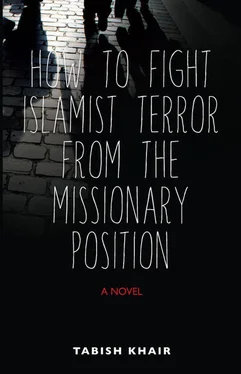I can still recall that afternoon. It was the last time I saw Lena and Ravi walk together. Ravi had finally told me about their separation, though I had realized after my night with Ms. Marx that I had been rather blind not to notice the way Ravi kept looking at his mobile and checking his computer.
The break-up had been his decision: Lena had not demurred, he told me with a short laugh. She had accepted it with the kind of grace, equanimity and poise that she brought to everything in her life. I had felt like shaking her, he said.
But then that day, we bumped into Lena on campus. She was so collected and polite that both of us felt we had no choice but to walk with her to her flat.
To be honest, Ravi was just as collected, even perhaps a bit debonair, as if all those moments of frantically grabbing his mobile had never taken place.
The sky was overcast, almost dark, though it could not have been much past four. With the first snow yet to fall, winter was just a watery waste. Lena and Ravi did not say anything of significance to each other. They said very little of significance to me either. Instead, they kept up a fragile shiny prattle that at times I hated both of them for. If ever there was a couple painfully in love and determined not to show it, it was them. Or is it that I had been too influenced by Ravi’s perspective on the matter?
When we reached the building, Lena said goodbye to us. She looked fleetingly at Ravi, and Ravi, who had been observing her a moment earlier, drinking her in with his eyes, managed to look away at that precise instant. As if each had coordinated his or her gestures in such a way as to avoid, with perfect timing, the other’s moment of weakness. Then we stopped on the pavement and Lena walked on to her building. She walked straight, steps as measured as always. She opened the heavy door of the building. The door was blue, its paint peeling, wood warped and scratched: it made a contrast to Lena’s youth and immaculateness. Just before going in, she half-turned. She did not wave.
It was only then that Ravi started walking away.
I had expected Ravi to do a repeat of what he used to do after his earlier break-ups: hit the bar, do ironic renditions of Mumbai film classics—Bombay, he would insist, as he refused to use the word “Mumbai,” attributing it to what he called Sena bullying—and have to be lugged to bed. But no, he hardly drank in the days left to him, not more than a glass or a couple of beers; he preoccupied himself with clearing out his office and other such practical matters. He read a lot and even wrote a bit. He called up old friends all over the globe and had bright, witty conversations with them. He still looked at his mobile too often, but that was the only slip. And once in a while, though always abruptly, he would say something about Lena.
“Words, words, words; she is so good with words!”
“So are you, Ravi.”
“Not in the same way, bastard. I do not trust words. No Indian does. Words leave me famished; I eye them with suspicion. Language is, first of all, a weapon. Man became the deadliest of all species when he invented language. If dinosaurs had survived until then, wordy Homo sapiens would have had them for breakfast! I could give up all words for one significant gesture: the breaking of bread, the offering of a glass of water to a stranger, the sitting down to eat around a cloth, the washing of feet.
“She is one of those people who gets frozen into poise. They become a mirror of themselves, echoes. That is why all she can do is echo me: if I want to live with her, that is what she wants too; if I want to separate, she is willing to accept that too for our sake. She can never do something that is frayed, awry, unexpected. And the pity, bastard, is that she has it in herself—have you looked into those green eyes? I have never seen eyes that color. There is a forest, a lush wilderness trapped in her eyes forever, petrified. She is a prisoner of herself.”
“So are you, Ravi,” I told him.
“What do you mean?” he retorted, genuinely nonplussed.
“You are trapped in yourself too, or perhaps you could learn to live with her cold poise, for you still do not have any doubts about her love.”
He looked at me and blinked. “No,” he said, “that is one thing I have no doubts about.”
I had read Ravi’s story, “A State of Niceness,” but I still did not fully understand. I asked him just once. It did not seem kind to ask him again. It was not just the suffering in his eyes that prevented me; it was his need to hide the suffering. But I did ask him once.
“I do not understand,” I said to him.
“Understand what?” he replied. “Shakespeare? Proust? Derrida? Ask, ignorant mortal, and thou shalt be answered!”
“You and Lena. If you love her, you know the full-glass version that you gave me, and she loves you, why all this?”
“Because it is the full-glass version,” he replied after a moment’s hesitation. “You see, my friend, behind any full glass there stretches a vast desert—you have no business quaffing that glass unless you have the courage to go mad in the desert if necessary.”
“Beyond me, Ravi,” I answered, choosing not to understand him. “But tell me this: whose fault then?”
Ravi laughed.
“You Eng Lit types, you never manage to escape your fucking Milton, do you?”
Then he asked me whether I had seen the film version of Fiddler on the Roof . I had not.
“You should,” said Ravi. “It is a great musical. You see, it starts with this traditional Jewish family in a small Russian village, just before the Russian revolution. The patriarch—played brilliantly by the Israeli actor Topol—has a number of daughters, all of whom break his ideas of what is right as they grow up and marry. One of them even falls for a communist revolutionary, a man from outside the community. There is a scene where this young communist, recently arrived in the village, has an argument with one of Topol’s friends. Topol, who always tries to dialogue even when he disagrees, listens to the young communist’s argument and pronounces, a patriarch to his very bones, ‘You are right.’ Then Topol’s friend makes his counter argument and that convinces Topol. ‘You are right,’ he tells his friend too. Another man standing in the group intervenes. ‘He is right, and he is right,’ says this third man, ‘but they cannot both be right.’ Topol thinks about it, looks at the third man and says: ‘You are also right.’”
“So?” I asked.
“So, my Miltonic friend,” replied Ravi, turning away so as to close the discussion, “you are also right.”
I wanted to retort that I could not possibly be right as I had not taken any stand. But it was obvious that Ravi had no wish to talk about the matter anymore.
Just once did I falter in my determination to let Ravi bear his loss—or whatever it was—in his own way. This was on an evening when he had loitered about the flat, cooked something superfluous in the kitchen, gone out, come back and finally ensconced himself on my bed, distracting me from the questions that I was framing for forthcoming exams, and proceeded to turn his mobile over and over again in his hands, as if telling the beads that Karim carried around. I was a bit irritated. I said to him, “Go on, yaar. Why don’t you just fucking ring her up?”
“No point,” he replied after a pause; a pause so long that I had gone back to setting questions, assuming that Ravi had chosen to ignore my outburst.
“Why? Are you afraid she’ll refuse to see you again?”
Ravi smiled a slow, pensive smile. He looked at his mobile.
“It is five forty. Wednesday,” he said. “You know, this is about the time she returns from her weekly singing lesson. I don’t even need to close my eyes to imagine the world in which she does those things. She walks up the stairs. She stops at her door. She turns the key and goes in, but not before straightening the doormat. She hangs up her coat; she goes into the bathroom to gargle with Listerine. She always gargles with Listerine after singing lessons. I imagine her do these things; I imagine the sounds and smells of her world. No, I don’t imagine her; I feel her in my bones, in my flesh. If she were to do anything differently, I would sense it. I would know. So, now, imagine that I call her. Do you know what will happen, bastard?”
Читать дальше












